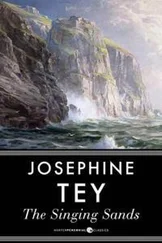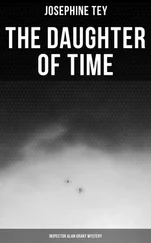‘Of course Zoë gets first choice of places to fish,’ Pat said.
If Grant had imagined that Pat’s infatuation would take the form of blushing silences and a mooning adoration, he was wrong. Pat’s only sign of surrender was the constant interjection of ‘me and Zoë’ into his conversation; and it was to be observed that the personal pronoun still came first.
So Grant borrowed the car after breakfast and went down to Moymore to tell Tad Cullen that a small boy with red hair and a green kilt would be waiting for him, with all appliances and means to boot, by the swing bridge across the Turlie. He himself would be back from Scoone in time to join them on the river some time in the afternoon, he hoped.
‘I’d like to come with you, Mr Grant,’ Cullen said. ‘Have you got a line on this thing? Is that why you’re going in to Scoone this morning?’
‘No. It’s to look for a line that I’m going in. There’s not a thing you can do just now, so you might as well have a day on the river.’
‘All right, Mr Grant. You’re the boss. What’s your young friend’s name?’
‘Pat Rankin,’ Grant said, and drove away to Scoone.
He had spent most of last night lying awake with his eyes on the ceiling, letting the patterns in his mind slip and fade into each other like trick camera work in a film. Constantly the patterns materialised, and broke, and dissolved, never the same for two moments together. He lay supine and let them dance their endless slow interlacing; taking no part in their gyrations; as detached as if they were a display of Northern Lights.
It was that way his mind worked best. It would also work the other way, of course. Work very well. In problems involving a time-place sequence for instance. In matters where A was at a spot X at 5.30 p.m. on the umpteenth inst, Grant’s mind worked with the tidiness of a calculating machine. But in an affair where motive was all, he sat back and let his mind loose on the problem. Presently, if he left it alone, it would throw up the pattern that he needed.
He still had no idea why Bill Kenrick had journeyed to the north of Scotland when he should have been travelling to Paris to meet his friend; still less had he any idea why he should have been travelling with another man’s papers. But he was beginning to have an idea as to why Bill Kenrick developed his sudden interest in Arabia. Cullen, looking at the world from his limited, flyer’s point of view, had thought of that interest in terms of flying routes. But Grant was sure that the interest had other origins. On Cullen’s own showing, Kenrick had exhibited none of the usual signs of ‘nerves’. It was unlikely that his obsession with the route he flew had anything to do with weather in any of its forms. Somewhere, sometime, on one of those flights over that ‘damned dreary’ route, Kenrick had found something that interested him. And that interest had begun on an occasion when he had been blown far off his course by one of the dust-storms that haunted the interior of Arabia. He had come back from that experience ‘concussed’. ‘Not listening to what was said to him.’ ‘Still back there.’
So this morning Grant was going in to Scoone to find out what might possibly have interested Bill Kenrick in the interior of that bleak and stony immensity; in the desert and forbidding half-continent that was Arabia. And for that, of course, he was going to Mr Tallisker. Whether it was the rateable value of a cottage or the composition of lava that one wanted to be enlightened about, one went to Mr Tallisker.
The Public Library in Scoone was deserted at this hour of the morning and he found Mr Tallisker having a doughnut and a cup of coffee. Grant thought the doughnut an endearingly childish and robust choice for a man who looked as though he lived on gaufrettes and China tea with lemon. Mr Tallisker was delighted to see Grant, asked how his study of the Islands was progressing, listened with interest to Grant’s heretic account of that Paradise, and was helpful about his new search. Arabia? Oh, yes, they had a whole shelf of books about the country. Almost as many people wrote books about Arabia as about the Hebrides. There was, too, if Mr Tallisker might be permitted to say so, the same tendency to idealise the subject in its devotees.
‘You think that, boiled down to plain fact, they are both just windy deserts.’
Oh, no; not entirely. That was being a little—wholesale. Mr Tallisker had had much happiness and beauty from the Islands. But the tendency to idealise a primitive people was perhaps the same in each case. And here was the shelf of books on the subject, and he would leave Mr Grant to study them at his leisure.
The books were in a reference room, and there was no other reader there. The door closed on the silence and he was left with his search. He went through the row of books very much as he had gone through the row about the Hebrides in the sitting-room at Clune, gutting each book with a swift practised eye. The range was much the same as it had been in the earlier case: all the way from the sentimentalists to the scientists. The only difference was that in this case some of the books were classics, as befitted a classic subject.
If Grant had had any last lingering doubt that the man in B Seven was Bill Kenrick, it went when he found that the desert part of south-eastern Arabia, the Empty Quarter, was called the Rub’al-Khali.
So that was what ‘robbing the Caley’ had been!
After that he devoted his interest to the Empty Quarter, picking each book from the shelf, flipping through the pages on this one region, and putting it back again to go on to the next. And presently a phrase caught his eye. ‘Inhabited by monkeys.’ Monkeys, said his mind. Talking beasts. He turned the page back to see what the paragraph had been talking about.
It was talking about Wabar.
Wabar, it seemed, was the Atlantis of Arabia. The fabled city of Ad ibn Kin’ad. Somewhere in the time between legend and history it had been destroyed by fire for its sins. For it had been rich and sinful beyond the power of words to express. Its palaces had housed the most beautiful concubines and its stables the most perfect horses in the world, the one no less finely decked than the other. It stood in country so fertile that one had only to reach out a hand to pluck the fruits of the soil. There was infinite leisure to sin old sins and devise new ones. So destruction had come on the city. It had come in a night, with cleansing fire. And now Wabar, the fabled city, was a cluster of ruins; guarded by the shifting sands, by cliffs of stone that for ever changed place and form; and inhabited by a monkey race and by evil jinns. No one could approach the place because the jinns blew dust-storms in the faces of those who sought it.
That was Wabar.
And no one, it seemed, had ever found the ruins although every Arabian explorer had looked for them, openly or secretly. Indeed, no two explorers agreed as to which part of Arabia the legend referred to. Grant went back through the various volumes, using the magic key, the word Wabar, and found that each authority had his own pet theory, and that the argued sites lay as far apart as Oman and the Yemen. None of the writers, he noticed, attempted to belittle or discount the legend as palliation of their failure; the story was universal in Arabia and constant in its form, and sentimentalist and scientist alike believed that it had its basis in fact. It had been every explorer’s dream to be the discoverer of Wabar, but the sands and the jinns and the mirages had guarded it well.
‘It is probable,’ wrote one of the greatest, ‘that when the fabled city is at last found it will be by no striving or calculation but by accident.’
By accident.
By a flyer blown off his course by a dust-storm?
Читать дальше












